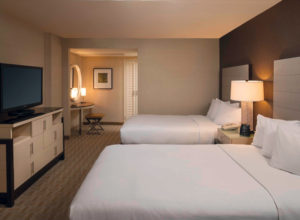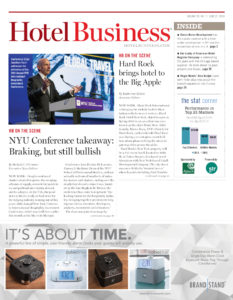LOS ANGELES—In accordance with criteria in Green Seal’s Environmental Standard for Hotels and Lodging Properties (GS-33), which calls for material recycling, the Hilton Los Angeles Airport hotel, a Green Seal certified hotel, has recycled 1,768 bed sets. The hotel is also preparing for compliance with California recylcing law SB 254, which takes effect this year.
The decision by the Hilton property has resulted in approximately 219,760 pounds of mattresses being diverted from landfills. The Hilton Los Angeles Airport hotel has been Green Seal certified (Bronze) under GS-33 since 2012. Green Seal is an independent nonprofit certifier of sustainable products and services.
“This Hilton has always been involved in sustainability, and it is only natural to recycle the mattress and box springs as part of our ongoing program to make the world and Los Angeles a better place,” said Grant Coonley, general manager of the Hilton Los Angeles Airport.
Green Seal’s President and CEO Arthur Weissman, Ph.D., added, “The Hilton’s decision to recycle their mattresses is a great example of what hotels can do to reduce waste and increase the sustainability of their property. Green Seal commends the Hilton Los Angeles Airport for being good stewards of the environment for the Los Angeles community.”
To achieve Green Seal Bronze certification, the Hilton Los Angeles Airport hotel takes specific measures to protect human and environmental health, such as using environmentally preferable products; conserving water and energy by using water- and energy-efficient fixtures; adapting water-saving landscaping measures; and reducing waste through recycling and minimizing disposable items. Green Seal certified hotels are periodically monitored to ensure they continue to meet GS-33 requirements.
The Hilton Los Angeles Airport hotel is part of a growing movement being spurred by the Los Angeles Green Lodging Program to use environmentally preferable products and adopt sustainable, cost-saving practices. As more hotels participate in the program, Los Angeles is increasingly becoming a green destination for conventions, businesses and tourists looking for green lodging destinations, according to Green Seal.
Green Seal, founded in 1989 and the city’s official certifier of green hotels, can help ensure that a property meets commercial recycling mandates by achieving Gold, Silver or Bronze levels of certification. Through its scientifically developed certification standards, the Green Seal certification process can assist and guide the lodging industry in meeting California’s green mandates.
In July 2012, California adopted AB 341, a 75% statewide recycling goal by 2020. This law points out that the more recyclables a business can divert from their trash, the greater potential savings and/or reduction in costs. Other benefits of recycling include the reduction of emission of methane, air toxics and pollutants from landfills. Additionally, SB 254 will require mattress manufacturers and retailers to develop a mattress recycling program to increase the recovery and recycling of used mattresses.
Green Seal hotels can be found in more than 17 states and major cities such as Los Angeles, Seattle, Chicago, New York, Washington and Atlanta. Green Seal certified hotels are achieving impressive results in terms of reducing their impact on the environment and human health, according to Green Seal.
In addition to the Hilton Los Angeles Airport, several hotels in Los Angeles have been certified under GS-33. These include the Westin Los Angeles Airport Hotel, Sheraton Gateway Los Angeles Hotel, Crowne Plaza Los Angeles International Airport and Westin Bonaventure Hotel & Suites. “They’ve responded very positively and all have been extremely cooperative,” said Gary Petersen, head of Green Seal’s Los Angeles office and a member of Green Seal’s board of directors.
Certified hotels have seen significant cost savings as well as a marked
reduction in their environmental footprints. In particular, the Westin Bonaventure Hotel & Suites, located in downtown Los Angeles, saves $641,000 a year from its effforts obtaining Green Seal Silver Certification. In 2009, the Westin Bonaventure became the first Los Angeles hotel to receive Green Seal Silver Certification for its carbon footprint reduction, achieved with recycling programs, energy conservation and management, and water conservation. The hotel invested $20,000 into its eco-friendly practices and has saved an estimated $225,000 per year.
“By choosing to become a Green Seal certified hotel, the Bonaventure is showing that a race to the top, not the bottom, can be beneficial to both the environment and to the company’s bottom line,” said Richard Alarcón, a former Los Angeles City Council member.
The City of Los Angeles, the Mayor’s Office and the Los Angeles Tourism & Convention Board have advocated the Green Seal program’s benefits to the area’s lodging properties. “We visited about 25 hotels in the past two months looking to do this and five of the 25 would like to join the program,” said Petersen. “The hotels get it about saving money and environmental impact because of legislative drivers.”
The 17-story, 1,234-room Hilton Los Angeles Airport, an upscale hotel located a quarter of a mile away from the Los Angeles International Airport (LAX), was one of the first lodging properties to join the Green Seal program. The Bronze entry level recognizes hotels with a strong foundation of sustainable practices. “Of all the hotels participating in the program, the Hilton Los Angeles Airport is the biggest program ever by recycling 1,768 bed sets,” said Petersen.
In addition to using the nationally recognized Green Seal mark, certified green hotels receive a “Certified Green Business” decal to post on their door or window; an electronic version of the logo to use in their promotional materials; and links on the LA Bureau of Sanitation, L.A. Tourism & Convention Board and Green Seal websites. HB


